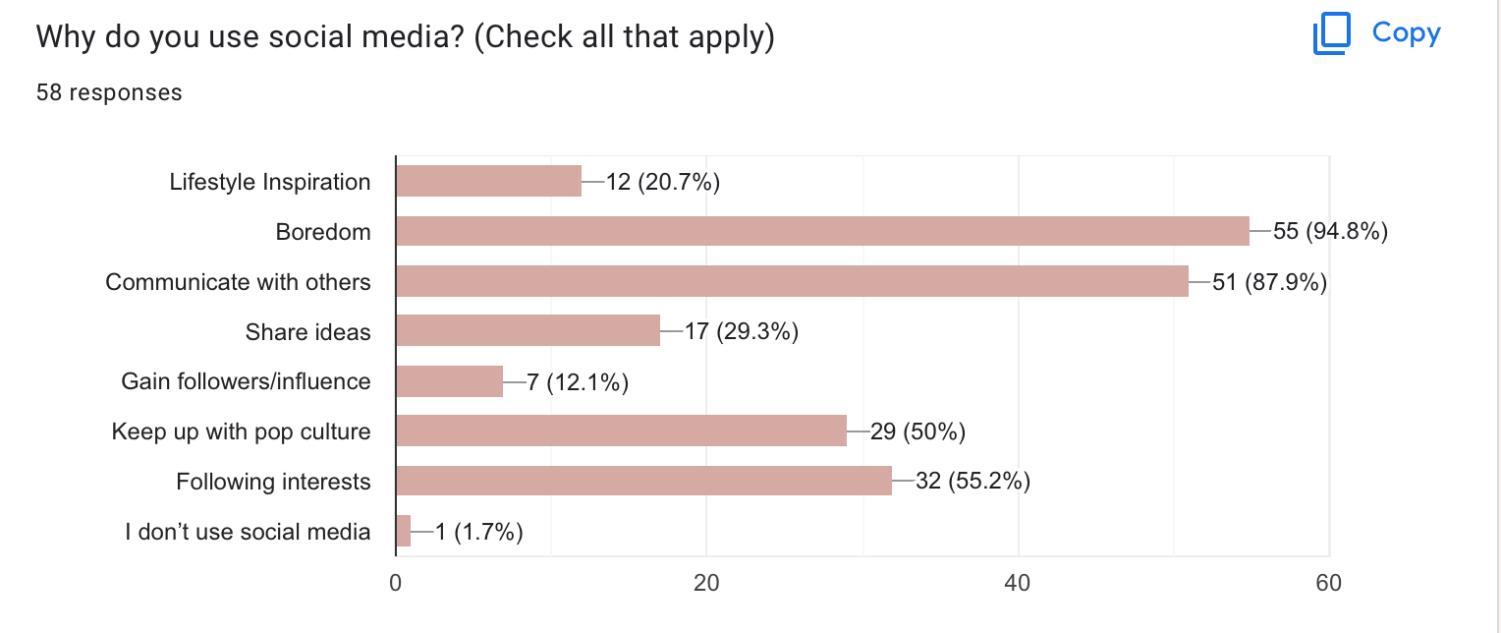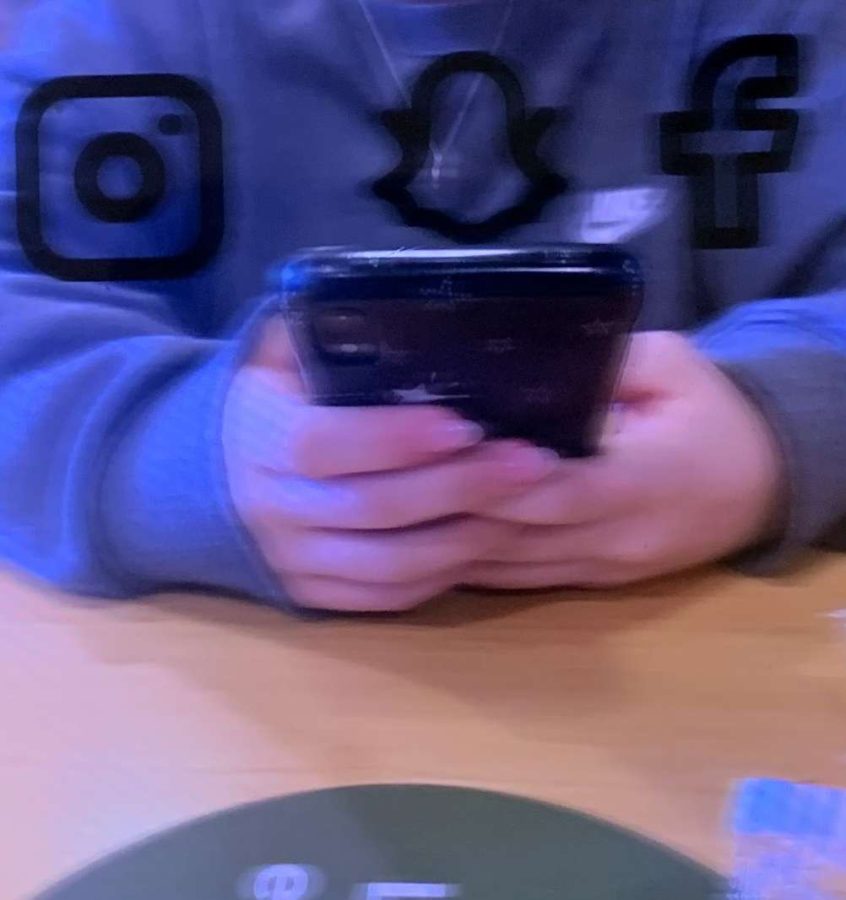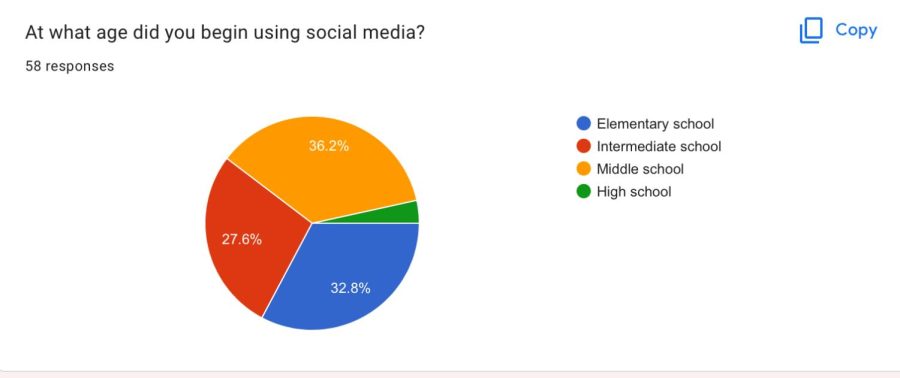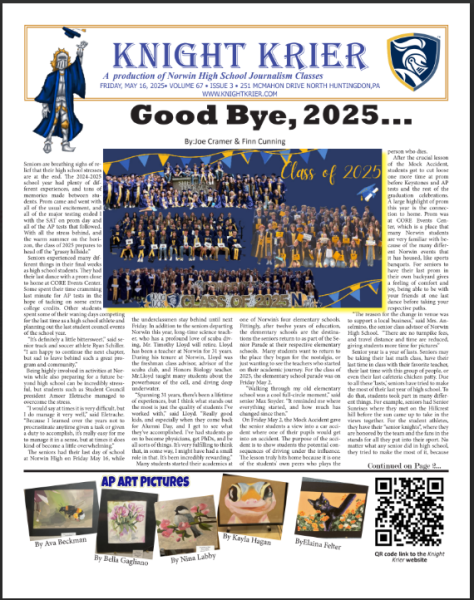Social media mania
A representation of how overwhelming social media can feel to teens.
It is 6:00 am. You wake up to the sound of your alarm going off. You hit snooze a few times, then finally bring yourself to grab your phone. The first app you open is Snapchat, to check your unopened messages and see what you missed out on. Then, you open Instagram, and you see what everyone is wearing and eating. You glance at the time and realize you are now running late for school. From the moment you wake up to the moment you go to bed, thousands of posts, advertisements, messages, and pictures are thrown at you. Teenagers across the globe are faced with issues pertaining to social media, and Norwin students are no exception.
Social media affects Norwin students’ lives every day. Teens are faced with problems, such as mental health, perception, judgment, and more, which are amplified by social media. Social media has many benefits, but often at a heavy cost.
According to Mayo Clinic, a 2019 study of 6,500 12- to 15-year-olds in the U.S. found that “those who spent more than three hours a day using social media might be at heightened risk for mental health problems.”
This means that teens who use social media for more than a few hours a day are found to be at a higher risk of mental health-associated problems. This is no exception for Norwin teens.
According to a recent poll of 60 Norwin students, over 35 percent of students said they use social media for over 5 hours a day. 95 percent of students who responded to the poll stated that they use social media as a result of boredom.

Many teens may not realize how often they use the internet and social media. A significant portion of Norwin’s population frequently uses social media. In the past few years, social media usage among teens has risen drastically.
In a survey conducted by the Pew Research Center, statistics revealed out of 1,316 teenagers aged 13-17 in the US, 97% now “use the internet every day,” up from 92% in 2014-15. Additionally, 46% say they “use the internet ‘almost constantly’” – a significant rise from 24% in 2014-15.
Within the last 7 years, social media usage has significantly risen among teens. The use of social media and the internet by teens is closing to almost 100 percent through the last decade, and as social media usage continues to rise, issues such as bullying and judgment rise as well.
In the Norwin survey, over 50 percent of students reported that they have personally experienced bullying through social media. About 46 percent of students say that social media has definitely impacted the way they view themselves or others.
Many teens are affected by social media in both positive and negative ways. Social media has allowed ideas and communication to spread faster than before. However, with that, judgment has been applied, as well as unrealistic standards have been set for young adults.
“I judge myself based on what I see on social media,” said Jillian Pensenstadler (11). “Beauty standards and all the other types of exclusions make me believe things that aren’t true. Social media has definitely affected my life in many ways.”
Norwin students are faced with pressure from their peers as well as themselves based on standards that social media has pushed. Often, judgment goes even further.
“People have no limits to what they share on social media,” said Nora (11). “I think that people search for content to be liked or ‘accepted’ by others. Sometimes I think the content is nasty towards something/someone else because they feel that it will make them less insecure about themselves/make them fit “social norms”/other people will like them more if they are rude to other people.”
Additionally, Nora commented, “I often find myself searching for content to post—the pressure to post on social media is something I really don’t like. My views of other people change based on the things that they post. People have become so outspoken about what they believe in and aren’t afraid to be brutally honest. As much as I don’t want those things to affect the way I view people, they often do change my opinions of them (usually for the worse).”
Teens often change the way they view themselves and others based on what they see on social media. Trends, such as clothes, fitness, and more can contribute to setting ideals and standards many may feel pressured to meet. However, social media is not all bad.
“I think I would not be in the mental space I am right now without social media, which isn’t a bad thing, because honestly social media has led to make my life better in some ways,” Said Ava Natalee (11). “At the same time it has made me compare myself to others which honestly pushed for my lifestyle changes.”
Social media can often inspire people to be the best versions of themselves. Sometimes when people see better, they want to do better. That said, the pressure of social media can be overwhelming at times. There are a few ways to “unplug.”
According to the article “Five ways to detach yourself from social media”: “social media is only as harmful as we let it be.” There are a few different ways to take a break from social media when it becomes too much. ‘The frequency and the intensity of your social media use determines whether or not you are ‚addicted’ to social media.”
In order to detox from social media, the article suggests that you first, ask yourself a few questions:
● Do you check your Instagram or Facebook (or any other social media platform) excessively?
● Do you find yourself obsessing over how many “likes” you get and become agitated when you don’t get enough?
● Do you equate the number of followers or friends on social media to popularity or likability?
● Do you feel envious or jealous when you see your friends’ “picture-perfect” lives on social media?
A few examples of ways to set a boundary with social media include finding and utilizing new hobbies, actively making plans, and considering deleting apps.
Drawing boundaries and keeping a distance from social media can be extremely important, especially for teens. The effects of social media can be damaging and even permanent.
There are many reasons we use social media, such as communication, boredom, inspiration, and more. No matter the reason, social media affects Norwin students in many ways both positive and negative. That said, there are ways to draw boundaries from the negative side of this social media mania.

Kyleigh is a first-year writer, and a senior at Norwin High School. In her free time, she enjoys volunteering within the community, and being with family...













